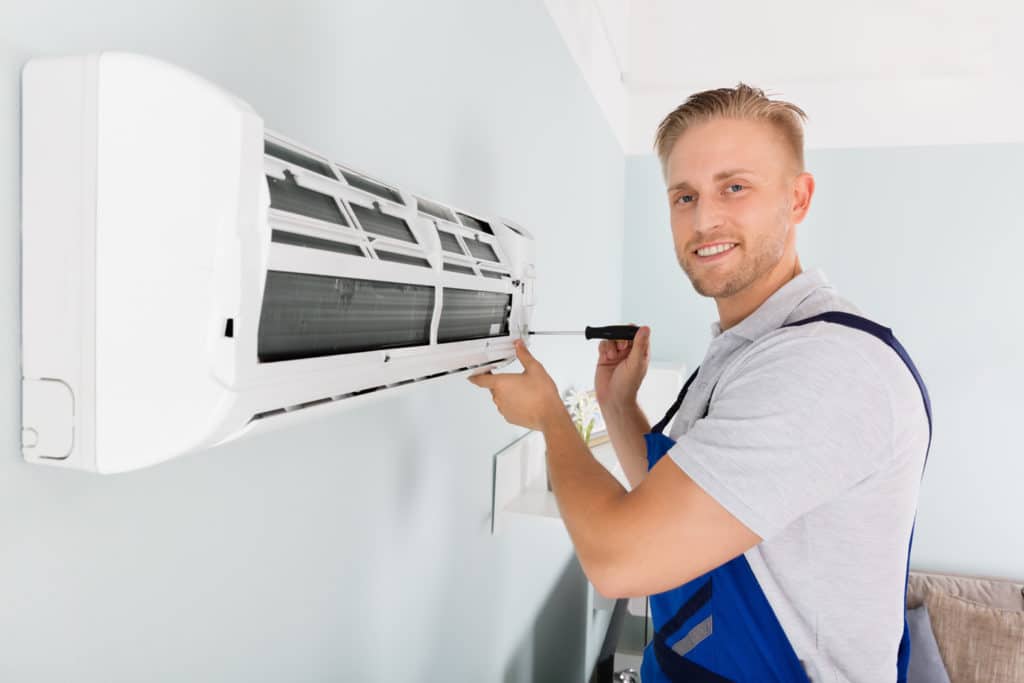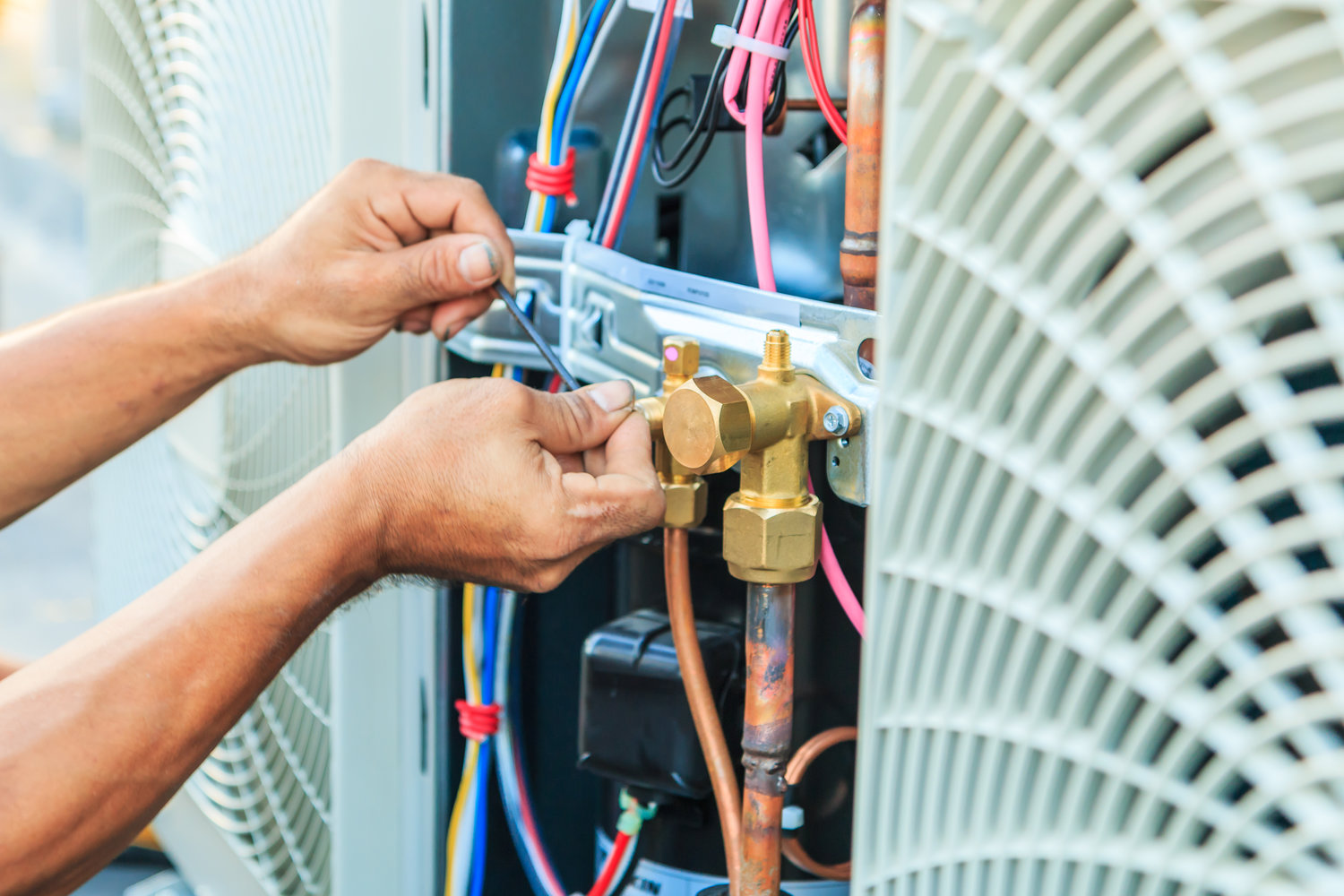Did you know that roughly 75% of home owners experience a/c sound problems at some point? When your air conditioner begins making odd noises, it can be quite disruptive to your tranquility and convenience.
From rattling and buzzing to squealing and banging, these sounds can show underlying troubles that need attention. Recognizing the source of the noise is important for effective repair services and ensuring your air conditioner operates efficiently.
So, if you're tired of bearing with annoying air conditioning sounds interrupting your serenity, there are services at hand.
Secret Takeaways
- Routine upkeep is important to attend to typical air conditioner sound sources like ductwork concerns and defective motors.

- Address vibrating sounds by evaluating for loosened components, maintaining fan motors, and adding resonance isolation pads.
- Squealing and banging sounds can be fixed by checking belts, follower blades, and compressor coils for problems.
- Repair AC sound issues by performing aesthetic examinations, applying soundproofing strategies, and troubleshooting for obstructions.
Common Air Conditioning Sound Sources
If your air conditioning system is making unusual sounds, maybe due to among several typical sources.
One constant offender is problems with the ductwork. In time, air ducts can establish leaks, loose links, or even blockages. These troubles can create air to move erratically, causing whistling or rattling sounds. A detailed ductwork assessment by a specialist can assist determine and correct these problems, recovering your system's smooth operation.
One more usual resource of noise in cooling systems is a malfunctioning motor. The electric motor is an important element that drives the fans and various other moving components within the system. If the electric motor is worn or harmed, it can create grinding, screeching, or clunking sounds. In such instances, motor replacement might be necessary to get rid of the resource of the disruption. Normal upkeep and timely motor substitute when needed can aid maintain your air conditioning system running silently and successfully.
Diagnosing Rattling and Buzzing Seems
To deal with rattling and buzzing sounds in your air conditioning system, beginning by evaluating the elements that might be creating these noises, such as loose components or damaged parts. Resonance isolation is key in settling these issues. Check for any loosened screws, screws, or panels that might be shaking against each other throughout procedure. Tightening up these can often minimize the rattling noises.
In addition, evaluate the fan motor for any indicators of wear and tear. Regular fan motor upkeep, such as lubrication and cleansing, can help reduce buzzing sounds caused by friction or breakdown.
If the rattling continues after examining and tightening parts, consider including resonance isolation pads or installs to soak up the excess resonances. These pads act as a barrier in between the shaking components, decreasing the sound. Bear in mind that attending to these noises immediately can avoid further damages to your air conditioning system and ensure its peak performance.
Resolving Screeching and Banging Sounds
When resolving squealing and banging noises in your air conditioning system, begin by identifying the source of the audios through a detailed evaluation of the device's parts. Examine the belt tension along with the motor bearings, as loosened belts or worn-out bearings can cause squealing noises. Inspect the fan blade for any kind of blockages or problems that might trigger banging sounds when the follower turns. Additionally, analyze the compressor coil for any particles or problems that might be creating the noises.

To deal with screeching sounds associated with belt tension, readjust the stress complying with the supplier's standards to make sure it's within the suggested variety. If the motor bearings are the wrongdoer, consider oiling them if possible; otherwise, they might need to be changed. air conditioner installation For banging noises brought on by follower blade problems, repair service or replace the damaged blades promptly. When it involves the compressor coil, cleansing it thoroughly can frequently fix any kind of noise-related issues. By dealing with these potential sources of squealing and banging sounds, you can restore your air conditioning system to its ideal working state.
Tips for Fixing Air Conditioning Sound
When confronted with air conditioning sound concerns, start by performing a visual assessment of the system's parts for any noticeable indicators of damages or wear. Try to find loosened parts, damaged belts, or particles that might be creating the sound. If you notice any kind of issues, ensure to tighten loosened parts, replace harmed components, and clear out any debris to see if the sound enhances.
To resolve cooling sound troubles, think about soundproofing methods to minimize the audio transmission from the unit. Shielding the wall surfaces around the unit, installing soundproofing panels, or placing rubber pads underneath the system can assist dampen the sound effectively.
Normal maintenance is vital to preventing a/c noise. Be certain that the device is clean, lubricated, and properly maintained to decrease potential problems. Fixing actions like examining the follower blades and motor for any kind of obstructions can also assist identify and deal with sound issues. For minor issues, DIY services such as tightening up screws or changing parts might fix the sound without the demand for specialist help.
Guaranteeing Effective AC Procedure
Guarantee your AC runs effectively by organizing normal upkeep checks and keeping the unit tidy and well-lubricated. Ensuring your a/c system functions at its best not only reduces sound however likewise lowers energy consumption. To attain this, execute noise decrease methods such as positioning vibration pads under the unit to wet sound transmission and making sure all components are safely tightened up. Furthermore, clean or replace air filters routinely to stop air movement clogs that can stress the system and rise noise degrees.
Power usage optimization is necessary for efficient a/c operation. Establish your thermostat to an appropriate temperature level to stay clear of overworking the device. Utilize ceiling followers to help flow awesome air better, enabling you to raise the thermostat slightly without compromising convenience. Consider setting up a programmable thermostat to change temperatures immediately when you're away. By adhering to these strategies, you can keep a comfy interior setting while minimizing power costs and sound levels.
Regularly Asked Questions
Can Cooling Sound Degrees Affect the High Quality of Indoor Air?
High cooling noise levels can influence interior air top quality by adding to environmental pollution, which can influence your health and wellness.

To address this, take into consideration soundproofing solutions to lower the sound from your cooling system.
Exists a Relationship In Between A/c Sound and Power Effectiveness?
When it involves cooling noise and power performance, there's indeed a relationship.
The loud sounds generated by your air conditioning system can indicate inefficiencies that bring about enhanced power usage.
By attending to and decreasing the sound pollution, you can improve the total effectiveness of your system.
Just How Can I Decrease A/c Sound Without Compromising the Air Conditioning Performance?
To minimize cooling noise without endangering cooling efficiency, think about soundproofing options like acoustic insulation.

You can optimize performance by adjusting the system for performance while dampening undesirable noises.
Attempt making sure all elements are correctly installed and kept, and look for loose components that could be causing extreme sound.
Are There Any Type Of Certain Rules or Standards Relating To Appropriate Noise Degrees for A/c Units?
When it involves cooling units, there are specific regulations and standards in position to assure conformity with appropriate noise degrees. These standards help endure a comfy setting without causing disturbances.
Rules regarding sound levels for cooling systems differ depending upon area, however generally concentrate on minimizing sound exhausts to a level that doesn't interfere with day-to-day activities. It's important to be mindful of these guidelines to make sure your system meets the needed requirements.
What Are Some Long-Term Upkeep Tips to stop Cooling Noise Issues in the Future?
To prevent air conditioning sound problems long-lasting, make sure you stick to regular upkeep. Clean or change filters, look for loose components, and keep the system clean.
Consider soundproofing methods like including insulation around the unit. By staying on top of upkeep and taking actions to lower noise, you can appreciate a quieter and a lot more effective cooling system in the future.
Final thought
Now that you have identified the usual resources of a/c noise and learned how to detect and fix them, you can enjoy a quieter and much more reliable air conditioning system.
Keep in mind to regularly look for any type of unusual noises and address them immediately to avoid any kind of further damages.
By caring for your air conditioning unit, you can guarantee it operates efficiently and efficiently for several years ahead.
